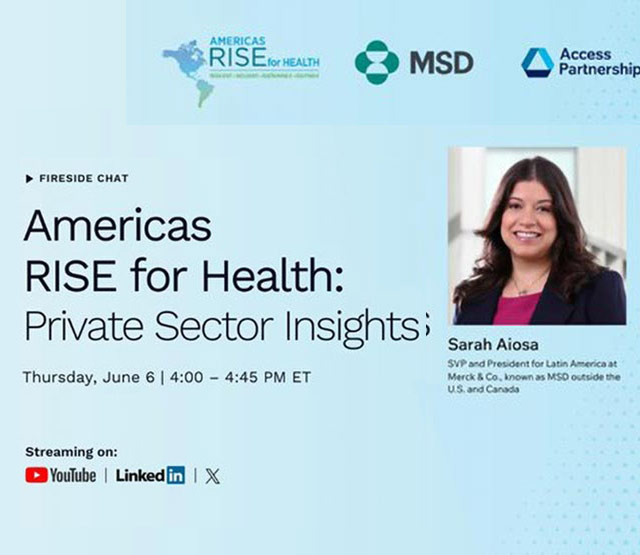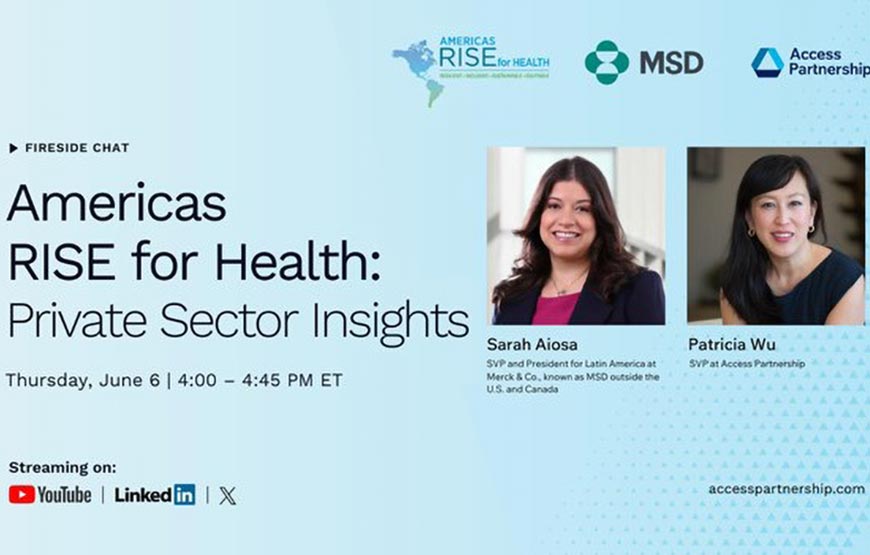

In an insightful virtual fireside chat organized by Access Partnership, Chair of the Americas Business Dialogue Health Working Group, Sarah Aiosa, Senior Vice President and President for Latin America at Merck & Co., known as MSD out the U.S. and Canada, highlighted the significant intersections between health and economic growth.
Sarah emphasized the pivotal role of health in driving economic advancement in the Americas, a region home to over 1 billion people when combined with the United States and Canada. She noted that three of the world’s top ten economies—U.S., Brazil, and Canada—are in this hemisphere, underscoring the global impact of health investments.
“Investing in health systems not only protects society but also boosts the economy because a healthy society is a more productive one. Health is wealth,” Aiosa remarked.
The COVID-19 pandemic has heightened the recognition among governments of the necessity for robust health systems capable of handling both emergencies and routine care. Despite progress, significant improvements in healthcare are still needed.
Addressing Underinvestment in Health
Patricia Wu, Chair of the ABD Health Working Group and one of the event’s speakers, highlighted chronic underinvestment in Latin America’s health sector. With public healthcare spending at only 3.5% of GDP compared to 6.6% in OECD countries, the region faces a substantial healthcare infrastructure gap. This underinvestment was starkly revealed during the pandemic, as Latin America had some of the highest mortality rates globally.
“Healthier populations mean healthier workers, more productivity, and better economic outcomes. Health can be a strategic economic asset, driving jobs, investment, and exports,” Patricia stated, emphasizing the potential for job creation in the health sector.
Opportunities for Growth and Improvement
Three key opportunities for impactful change were identified:
- Prioritizing Health as an Investment: Increasing health investment to at least 6% of GDP, as recommended by the OECD, and ensuring equitable access through innovative care models and digital health technologies.
- Addressing Regulatory Bottlenecks: Utilizing regulatory reliance to expedite the approval of innovative medicines and vaccines, thereby improving patient access to new therapies.
- Fostering Innovation and Access: Enhancing R&D investments in Latin America and creating enabling conditions for sustained investment.
The event showcased RISE’s unique approach to accelerating change through multisectoral collaboration. Patricia explained that achieving resilient, inclusive, sustainable, and equitable health economies requires the involvement of various sectors, including government, private industry, and civil society. The U.S. Government, particularly the Departments of Commerce and Health & Human Services, has been instrumental partners in RISE since its inception.
RISE’s workstreams have led to multisectoral collaboration on several concrete projects, including:
- Developing a primer for innovative health financing mechanisms.
- Establishing a RISE Network for Regulatory Capacity Building.
- Creating a training for procurement officials on value-based procurement.
- Expanding health ethics frameworks.
- Creating a common Digital Health Nomenclature document.
- These initiatives aim to address critical gaps and accelerate access to healthcare across the region.
Both speakers manifested their commitment to healthcare and shared their vision of collaborative efforts across sectors to build robust health systems.
For more information on Americas RISE for Health and to join future events, please visit the technical secretariat website.
